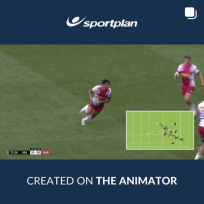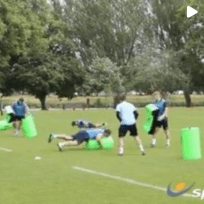Sportplan rugby has played a large role in my team's love for the game!
I am a coach with an under 10 rugby side. Last season the team found it hard to stay in their positions (acting like a swarm of bees). Can anyone suggest how i can get them to stay in positions, particulary our backs.
Hi there, I was wondering thoughts on forward positions at the kickoff. Do you have the catchers deep so the are coming forward to meet the ball or have one deep and one short? For the pods do you have a "quick" pod made up of all three loosies and a lock and a "slow" pod made up of the front row and the lock or do you split them in two pods made up of a prop, a lock and two loosies and the other pod of a prop, a lock, the hooker and a loosie? Who would you tell to be the ball carrier, body movers and bridger? All thoughts welcome. CheersDave
PLAYERS STRUGGLE TO KEEPTHEIR POSITIONS ON PITCH. My young team of 11 to 13 year olds struggle to hold position on the pitch, with a stand off ending up on the wing, the winger ending up at scrum half etc! How can I help them to keep their positions?
We have open this thread to continue the discussion on Player Empowerment started in the Coaches Hot Tip in this month's newsletter. If you missed it, here it is again. There is no doubt that if you want your team to be successful, you need the players to make decisions on the pitch for themselves. We know that if a team is used to getting the answers to problems on the field from the coach, it will mean that they will hesitate and look to the touchline before commiting to an action and that, of course, will be far too late! The coach can still influence things but once the game has started it is a fairly minimal influence, during the game it must be the players who react to situations as they happen and make decisions immediatley. Therefore, it is essential to have leaders in the team who feel confident about making decisons in the heat of the battle. They need to know that even a wrong call is better than no call. They should feel that their coach will support them in making a call and, if it was not necesarily the best decision, will help them make a better one next time without being too critical. Ideally, the leaders and decision makers will be at key positions in the team where they can communicate with other players as well as influencing play themselves. Key positions are Numbers%3A 2; 4/5; 8; 9; 10 and 15. This is often referred to as "The Spine or Backbone" of the team. This is not to say that a good captain and leader can't be in another position but if they are, for instance an 11 or 14, they will need good co leaders in the key positions to communicate their decisions during a game. To develop this spine to operate as leaders, the coach should involve these players in discussions about how the team are playing - making them feel some ownership and responsibility for the teams performance. They could also be involved in unit practises, for instance the 2 and 8 could Normal 0 false false false MicrosoftInternetExplorer4 occasionaly lead part of a line out practice, once the coach has agreed with them what the practice needs to achieve. The coach is not giving the players complete control but rather, allowing them to be involved in the process of team development. Obviously, the age and ability of your team can affect how far along this path you can go but, even with players as young as Under 8's, I have found that delegating some responsibility is a really effective way to build a cohesive and well functioning team! Let me know your thoughts on this type player empowerment. Good luck Simon
u19 scrum rules
Ask a question and have it answered by Coaches from around the world and Sportplan's team of Experts.
I would like some help/drills to help me introduce U9's to positions ie%3A start playing in set positions during a game ie forwards/backs. Up til now they have not had set positions & its been everyone follow the ball. I need to get them to understand & keep to positions during a game.
My son has played all season U9's on the wing and has now be brought into a inside centre role. What are the key differences he needs to make to be successful in his new position
Under 8's drills%3A how to get players to stay in position (in their channels) defensively to avoid them chasing the ball all over pitch! thanks, David
The law says that a forward pass is one "thrown forward" "in the direction of the opponents' goal line" Does that mean that, if the ball is passed and the receiver catches it NEARER to the opponents goal line than from where the ball was passed that the pass was forward? (Leaving to one side any other touches of the ball that might have taken place.) Maybe an example is better. Player 1 passes the ball sideways - releasing it on the 22 metre line. Player 2 (with no other player having touched the ball), running from well behind the 22 metre line, catches the ball when it has travelled sideways but the ball is now 20 metres from the opponents goal line (2 metres further forward from the place that the ball was passed). Is that a forward pass or throw forward? And if not, why not?
please how do idefine the players in the pitchie. who is the flanker, hooker, fly half etc
How can i improve my skills on the field as a flyhalf
Hey there everyone. I'm taking on a head coaching role for a collegiate women's side that is about 35-40 players deep. I'm looking for any general planning strategy that can maximize keeping everyone engaged and active in the practice with as little standing around as possible. Any tips or way ahead is greatly appreciated, cheers.
This is my first year playing on a rugby team for my school, grade 9, im much smaller than everyone else but i run fast and can be strong. my position is the blind side wing, and i dont understand what im supposed to do. it seems like i just jog and stay far away, but i dont know what im supposed to do if someone from the opposite team comes near me and noone else is one them, am i supposed to tackle? i also have trouble tackling cause my arms dont rap fast enough when they run into me, any advice?
I have started an under 10s team up, and I would say about 8 from the 13 children I have , did not play rugby until about 6 months ago. Of these players, there seems to be a lot of potential, as we are scoring tries against teams, that very rarely concede tries.the problem I got with them, is that we are very poor at organising our selves in defense when the opposition has the ball, which does result in us conceding quite a few tries. We have some very good tacklers in the team. Can anyone offer some ideas on how I can get them to organise themselves? Thanks . Chris.
Hello, in open play i want to have my forwards split up across the field not just chasing the next ruck. im not sure exactly how to teach them where they should be standing. (positional play) (Dane coles always seems to be a wing in open play)
My coach has put me at openside flanker and I'm confused of where i should be after the scrum. Should I be attacking the opposing scrum half or just trailing behind the backs waiting to clean up/ form a ruck? It would be great to know what I'm doing !
I have just started helping our head coach with under12's team. He wants to retire and has put me forward to be head coach next season. I am a little worried on how i should aproach training with the boys, going to a full 15 a side team on a full pitch. Any ideas would be greatly appreciated.
Positional rotation at U9 level... I originally posted this as answer to a question about squad rotation, but thought I might get a better response if I posted it as a question in its own right... I have an 8 year old at the age level you are talking about - he isn't the best player at the club by any means, but has his good moments. He loves watching the game, he has a good understanding of the way it is played (to the extent that he has often shouted at the telly over recent weeks at some of our illustrious stars when they're out of position) and he has good handling skills - to be honest he's just not brave enough in the tackle yet, but I know it'll come so I'm not making a big thing of it. However, he and a couple of others are constantly stuck on the wing, and are getting fed up with the fact that they don't get the opportunity to get involved much. The coaches seem to have their "big names" and as you say seem more interested in the short term aims of winning each game rather than trying to keep the lads interested and challenged each week. I know my son's aware that I think they should move them all around, although I have made a point of not criticising the coaches at all - I think he heard me talking about it to someone else. The coaches have talked about moving players to different positions, but haven't done it, and aren't really receptive when they are asked about it. There are two coaches, and the one that seems to have the "casting vote" is pretty autocratic and doesn't seem to accept criticism or suggestions. My son has mentioned about moving to another club, where he may or may not get more of a chance to shine, but I am not sure this is the right move as it may teach him to give up rather than sticking with something. Any thoughts please?
Beep test - suggested levels of achievement. I coach at level 7 in England am looking for any data on the average level in beep test that should be achieved by different positions (e.g front row, back row, backs). Does anyone have any data or suggestions?

in more ways than one




Here are the 5 ways that you can kickstart your 2025 in the correct way with Sportplan and make this the best coaching year you have had!

How did the Modern Olympics originally begin and why are they so culturally significant today?

The Professionalisation of Netball is changing the game. Here is how it is helping to develop the sport.
Coaches from around the world look to Sportplan for coaching confidence.